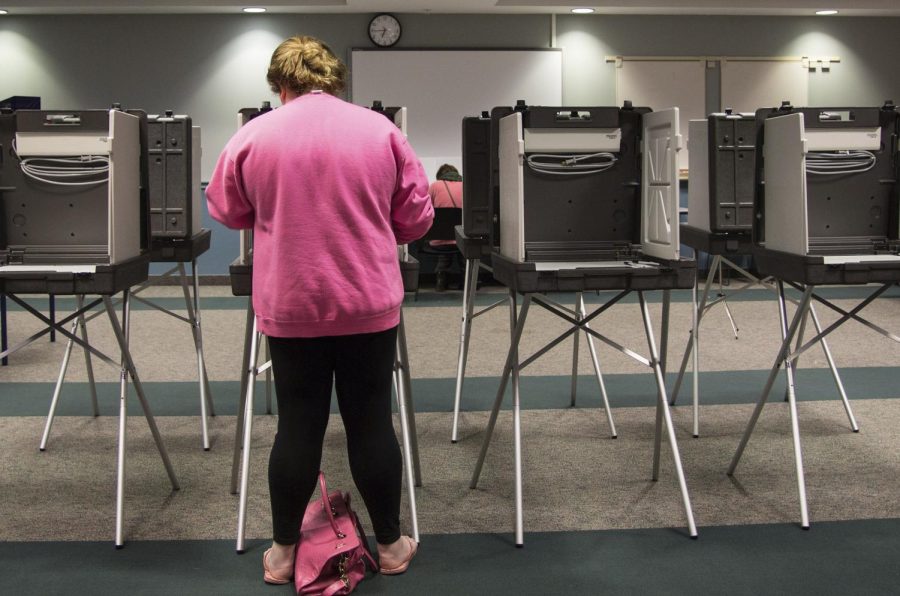Groups train poll observers
Freshman Elizabeth Nunemaker votes at the Student Recreation and Wellness Center on Tuesday March 15, 2016. Ohio is one of the five states to vote in the primaries on this day.
The Carter Center, a public policy group founded by former President Jimmy Carter, has been working with the League of Women Voters in Ohio to train observers for the upcoming Nov. 8 election.
Announcing its partnership with the National Conference of State Legislatures in August, the Carter Center will examine current regulations and access in becoming an election observer, with Ohio being the only state to be a part of this project.
The Carter Center is a non-profit organization started in 1982. The organization works on a variety of projects such as advocating human rights and combating diseases such as malaria.
“It’s an outgrowth of the project with NCSL, which has been focused primarily on research and info-gathering,” said David Carroll, director of the Democracy Program within the Carter Center. “As we implemented the project, we realized that there was an info and knowledge gap — not only about the varying access for observers in the U.S., but also more broadly about the methods used by international election observers.”
According to a joint study by the NCSL and the Carter Center released in August, while observation conducted by members of political parties and candidates is permitted, several states had no provisions for observers of a domestic, nonpartisan or international organization. And, while these groups are not barred from observing elections, county officials have often left the decision of granting access to observers.
Carter, in a press release, said that while the organization has observed countless elections in other countries, the need for transparent and credible election processes was needed in the U.S. to build the citizens’ confidence in the electoral system.
“Credible election observation is a key way to ensure that citizens can understand and be included in supporting good electoral processes in the United States,” Carter said.
The Carter Center is in the process of training members of the League of Women Voters in Ohio to serve as the group’s first venture into implementing trained observers within the country.
Carrie Davis, executive director of the League of Women Voters based in Ohio, said the Carter Center is well known for sending observers to other countries. The organization is serving as the pilot test for the center.
“We’re in the process of recruiting volunteers right now, and we plan to have volunteers deployed around the state of Ohio on Election Day who can observe and report on how Ohio’s election is doing,” Davis said.
Davis believes that one of the reasons why Ohio was chosen for the pilot test was due to its expansive population having an urban and a rural landscape — almost resembling the U.S. in its diverse regions.
When asked about the Carter Center sending observers to Ohio, as well as Republican presidential nominee Donald Trump’s recent calls to have his supporters police the voting stations, Theresa Nielsen, deputy director for the Portage County Board of Election, said to become an observer, the individual must go through a process.
“In order to be an observer at a polling location, you just can’t show up,” Nielsen said. “(You) must file paperwork with the Ohio Secretary of State and forward it to the county that it applies to.”
Diana Gerdes, a freshman communications major, said she feels like that some people could use the observer role to intimidate people at the polls, even though it may not be their intention.
“I feel that with all the tension going on with this election, people can get emotional and (it can) lead to possibly a scuffle,” Gerdes said.
First-time voter Katie Chilson, a senior public relations major, said it’s up to whoever is voting on whether they would feel intimidated or not.
“Personally, I feel that as long as the observer isn’t staring me down or actively yelling, then it shouldn’t be an issue,” Chilson said. “If anything, I think there shouldn’t be any fraud, and if voter monitors accomplish that, then it works.”
Angelo Angel is a senior reporter, contact him at [email protected].



